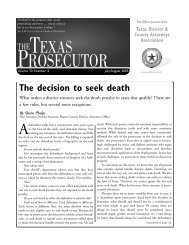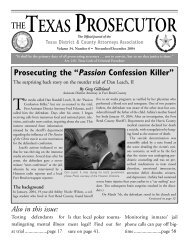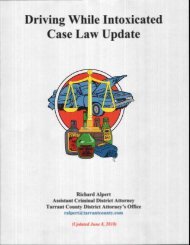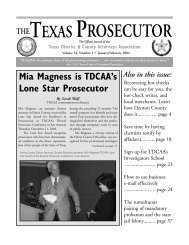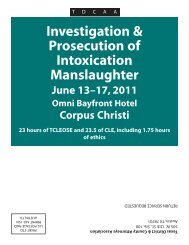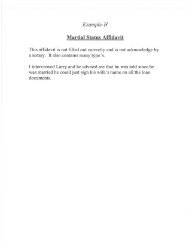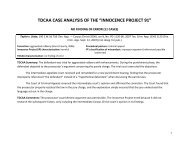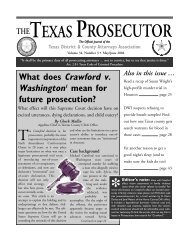Driving While Intoxicated Case Law Update - Texas District ...
Driving While Intoxicated Case Law Update - Texas District ...
Driving While Intoxicated Case Law Update - Texas District ...
You also want an ePaper? Increase the reach of your titles
YUMPU automatically turns print PDFs into web optimized ePapers that Google loves.
explain the margin of error or the underlying scientific theory of radar and no evidence showing the<br />
validity of the underlying theory or technique applied was offered. The appellant objects and cites<br />
Ochoa for the proposition that the predicate under Kellv was not met. The Court rejects that<br />
argument holding that in light of society's widespread use of radar devices, '\ue view the underlying<br />
scientific principles of radar as indisputable and valid as a matter of law." Allthe State needed to<br />
esfabfsh was that the officer applied a valid technique correctly on the occasion in question and<br />
the Court finds that a trier of fact could have found the officer's testimony sufficient.<br />
4. LIDAR RADAR AS SOLE BASIS FOR STOP WITHOUT PROOF OF<br />
RELIABILITY IS INSUFFICIENT<br />
Hall v. State, 297 S.W.3d 294 (Tex.Crim.App. 2009).<br />
Ihr's case involved a sfop for speeding based on LIDAR radar device. ln finding there was no PC<br />
to support the stop, the Court of Criminal Appeals held there was no evidence that the LIDAR<br />
device uras used fo confirm the anesting officer's independent, personal obseruation that defendant<br />
was speeding. There was no evidence to show that use of LIDAR technology to measure speed<br />
supp/ies reasonably trustworthy information or that the trial judge took judicial notice of this fact,<br />
aswellasfusbasr.sfordoingso. Asaresult,theStatefailedtoestablishthattheofficer,whorelied<br />
solely on LIDAR technology to conclude that the defendant was speeding, had probable cause to<br />
stop him.<br />
5. RADAR NOT NEEDED TO JUSTIFY STOP FOR SPEEDING<br />
Deramus v. State,2011 WL 582667 (Tex.App.-Fort Worth 2011).<br />
Officer had reasonable suspicion that defendant was violating the transportation code by driving<br />
at a speed that was neither reasonable nor prudent as required to supportthe traffic stop. Although<br />
there was no evidence of the posted speed limit and no radar was used, the officer testified that<br />
defendant was driving at a speed that exceeded the speed limit as he was familiar with what a car<br />
traveling that block looked like at the speed limit. ln upholding the stop, the Court points out an<br />
officer ls nof required by statute fo use radar to confirm spee4 and that it is not always possible<br />
for an officer to do so. Nor does fhe Sfafe have to show the defendant actually committed a traffic<br />
violation as long as evidence shows officer reasonably believed a violation occurred.<br />
N. CITIZEN'S ARREST FOR "BREACH OF THE PEACE" AS BASIS FOR STOP<br />
Cunninqham v. State,2004WL28O3220 (Tex.App.-San Antonio, 2004, no pet.) (Not designated<br />
for publication).<br />
The defendant nearly hit vehicte of a private security officer-forced him off the road and then<br />
proceeded to weave in his lane. These actions constituted a breach of the peace and posed a<br />
continuing threat to the safety of the community. Additionally, upon being approached after<br />
stopping his vehicle at a drive-through, the defendant exhibited further symptoms of intoxication<br />
and admitted he had consumed several beers. Court held thatthe defendant commifted a breach<br />
of the peace and a citizen's arrest was authorized in this instance.<br />
21



